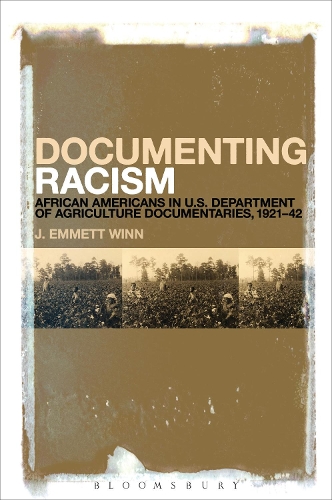
Documenting Racism: African Americans in US Department of Agriculture Documentaries, 1921-42
(Paperback)
Publishing Details
Documenting Racism: African Americans in US Department of Agriculture Documentaries, 1921-42
By (Author) Professor J. Emmett Winn
Bloomsbury Publishing PLC
Bloomsbury Academic USA
16th January 2014
United States
Classifications
Professional and Scholarly
Non Fiction
Social discrimination and social justice
Ethnic studies / Ethnicity
Racism and racial discrimination / Anti-racism
791.43652996
Physical Properties
Paperback
168
Width 152mm, Height 229mm
236g
Description
This book is open access and available on www.bloomsburycollections.com. It is funded by Knowledge Unlatched. From the silent era through the 1950s, the U.S. Department of Agriculture was the preeminent government filmmaking organization. In the United States, USDA films were shown in movie theaters, public and private schools at all educational levels, churches, libraries and even in open fields. For many Americans in the early 1900s, the USDA films were the first motion pictures they watched. And yet USDA documentaries have received little serious scholarly attention. The lack of serious study is especially concerning since the films chronicle over half a century of American farm life and agricultural work and, in so doing, also chronicle the social, cultural, and political changes in the United States at a crucial time in its development into a global superpower. Focusing specifically on four key films, Winn explicates the representation of African Americans in these films within the socio-political context of their times. The book provides a clearer understanding of how politics and filmmaking converged to promote a governmentally sanctioned view of racism in the U.S. in the early 20th century.
Reviews
J. Emmett Winn's Documenting Racism: African Americans in US Department of Agriculture Documentaries, 1921-42 presents a scholarly and illuminating study of representations of African-Americans in some key documentaries released by the US Department of Agriculture. Since these films are little-known, Winn provides important contextualization of once much seen and influential documentaries and strong criticism of the racism embedded in these films. -- Douglas Kellner, UCLA, author of Cinema Wars and Media Spectacle and the Crisis of Democracy
Winn makes a compelling case for the study of the USDA's films depicting rural black life in the American South. For scholars interested in early attempts to frame race through film, this book painstakingly documents the white supremacist ideologies that informed modern segregation. -- Lisa M. Corrigan, Assistant Professor of Communication, University of Arkansas, US
Author Bio
J. Emmett Winn is Professor of Film Studies at Auburn University. He is the co-editor of Transmitting the Past: Historical and Cultural Perspectives on Broadcasting (2005).
